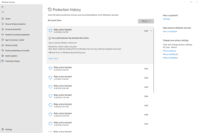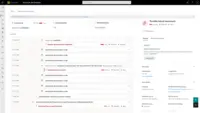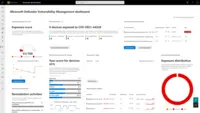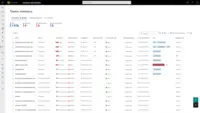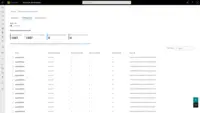Microsoft Defender for EndpointFormerly Microsoft Defender ATP
Overview
What is Microsoft Defender for Endpoint?
Microsoft Defender for Endpoint (formerly Microsoft Defender ATP) is a holistic, cloud delivered endpoint security solution that includes risk-based vulnerability management and assessment, attack surface reduction, behavioral based and cloud-powered next generation protection, endpoint detection and response (EDR), automatic investigation…
Microsoft Defender for Endpoint Review
Microsoft Defender for Endpoint Review
Defender Review
Microsoft Defender for Endpoint Review.
Microsoft Defender for Endpoint Review
Microsoft Defender for Endpoint Review
Microsoft Defender for Endpoint Review
Microsoft Defender for Endpoint Review
Microsoft Defender for Endpoint as a EDR tool
Defender for Endpoint Review
Microsoft Defender for Endpoint Review
Microsoft Defender for Endpoint Review
A reliable End to end security package.
Perfect Endpoint Security, Exposure Detection and Management Tool.
How Microsoft Defender for Endpoint Differs From Its Competitors
Components
Components
Protection Scope
Components
Protection Scope
Components
Protection Scope
Protection Scope
Components
Protection Scope
Windows - approx. 10,000
Windows server - approx. 1,200
macOS - 70
Linux server - 400
Components
Protection Scope
Components
Components
Protection Scope
Components
Protection Scope
Components
Protection Scope
Components
Protection Scope
Components
- Attack Surface Reduction helps us proactively block commonly used attack methods by malware (scripts).
- We use Microsoft Defender for Endpoint as a layered approach with other security tools.
Protection Scope
Components
- Vulnerability Management
- Baseline Assessments
- Device Discovery
- Endpoint Security Policies
- Automated Remediation
- Dynamic Device Tagging
- Endpoint DLP
- Web Content Filtering
- Live Response
- Unified integration with Defender for Cloud
- Always remediate PUA
- Device Deception (Preview)
- Download quarantined files
- Evaluatio…
Protection Scope
Components
Protection Scope
Components
1. Centralised deployment of antivirus agent
2. Centralised monitoring of security alerts
3. Vulnerability management
4. Antivirus and anti malware
5. Integration with Microsoft Intune
6. Device …
Components
Endpoint Detection and Response (EDR) : Organizations can investigate security incidents, collect pertinent data, and implement the necessary remediation activities to eliminate and contain threats by using …
Protection Scope
We are protecting over 30 Windows devices for our company, as well as more than 50 Windows and macOS devices for one of our customers. We also use Microsoft Intune to manage over …
Components
2. Advanced Threat Protection
3. Attack Surface Reduction
Protection Scope
Components
Protection Scope
Components
Threat & Vulnerability Management
Intune Integration
Microsoft Defender Antivirus
Microsoft Defender SmartScreen
Attack Surface Reduction
Components
Protection Scope
Components
Protection Scope
Components
Protection Scope
Components
Protection Scope
Components
Protection Scope
Awards
Products that are considered exceptional by their customers based on a variety of criteria win TrustRadius awards. Learn more about the types of TrustRadius awards to make the best purchase decision. More about TrustRadius Awards
Popular Features
- Malware Detection (53)8.585%
- Infection Remediation (52)8.282%
- Anti-Exploit Technology (51)8.080%
- Centralized Management (52)7.979%
Reviewer Pros & Cons
- We have visibility of what's going on and that's pretty much it, but before we don't have any visibility and it was just open for everybody. Now we co...
- I wish there was a way to filter whatever. You could see so much things that you could see within a particular example. You scan a pc, there's hundred...
Pricing
Academic
$2.50
Standalone
$5.20
Entry-level set up fee?
- No setup fee
Offerings
- Free Trial
- Free/Freemium Version
- Premium Consulting/Integration Services
Product Demos
Microsoft Defender for Endpoint Overview
Features
Endpoint Security
Endpoint security software protects enterprise connected devices from malware and cyber attacks.
- 8Anti-Exploit Technology(51) Ratings
In-memory and application layer attack blocking (e.g. ransomeware)
- 8.5Endpoint Detection and Response (EDR)(51) Ratings
Continuous monitoring and response to advanced internet threats by endpoint agents.
- 7.9Centralized Management(52) Ratings
Centralized management supporting multi-factor authentication, customized views, and role-based access control.
- 7.8Hybrid Deployment Support(10) Ratings
Administrators should be able to choose endpoint security on-premise, cloud, or hybrid.
- 8.2Infection Remediation(52) Ratings
Capability to quarantine infected endpoint and terminate malicious processes.
- 8.3Vulnerability Management(50) Ratings
Vulnerability prioritization for fixes.
- 8.5Malware Detection(53) Ratings
Detection and blocking of zero-day file and fileless malware.
Product Details
- About
- Competitors
- Tech Details
- FAQs
What is Microsoft Defender for Endpoint?
Rapidly
stops threats: Protects against sophisticated threats such as
ransomware and nation-state attacks.
Scales security: Puts time back in the hands of defenders to prioritize risks and elevate the organization's security posture.
Evolves the organization's defenses: Goes beyond endpoint silos and mature the organization's security based on a foundation for extended detection and response (XDR) and Zero Trust.
Microsoft Defender for Endpoint Features
Endpoint Security Features
- Supported: Anti-Exploit Technology
- Supported: Endpoint Detection and Response (EDR)
- Supported: Centralized Management
- Supported: Infection Remediation
- Supported: Vulnerability Management
- Supported: Malware Detection
Microsoft Defender for Endpoint Screenshots
Microsoft Defender for Endpoint Video
Microsoft Defender for Endpoint Competitors
Microsoft Defender for Endpoint Technical Details
| Deployment Types | On-premise |
|---|---|
| Operating Systems | Windows |
| Mobile Application | No |
Frequently Asked Questions
Comparisons
Compare with
Reviews and Ratings
(186)Attribute Ratings
Reviews
(1-25 of 84)Microsoft Defender for Endpoint Review
Microsoft Defender for Endpoint Review
Defender Review
Microsoft Defender for Endpoint Review.
Microsoft Defender for Endpoint Review
Microsoft Defender for Endpoint Review
Microsoft Defender for Endpoint Review
Microsoft Defender for Endpoint Review
Microsoft Defender for Endpoint as a EDR tool
Defender for Endpoint Review
Microsoft Defender for Endpoint Review
Microsoft Defender for Endpoint Review
A reliable End to end security package.
Microsoft Defender for Endpoint Review
Quick to rollout and get going, but takes some tweaking to optimize.
It is also very good and easy to setup for home users. Plus, it is free for home users using Microsoft operating systems.
Microsoft Defender Review
The one stop security shop for the endpoints
Microsoft Defender for Endpoint will be a great choice when you are a big organization (more than 500 endpoints) and are dealing with customer data from a critical industry.
Although if you lie in the SMB segment, taking standalone Microsoft Defender for Endpoint plans will make you confused about which features to go for and which ones to let go off. Hence, explore other options here.
Decent Protection for your endpoints
For MS Windows environment, the protection and collaboration with Windows firewall is expected and can be and additional compliment to each other
- Companies having Microsoft Windows based setup
- Having in house and remote devices which should be protected
- Compliance requirements to centrally manage devices
- Centrally monitor devices
- Centrally receive security alerts for issues and attacks on devices
"Microsoft Defender for Endpoint One of the best tool to manage threat, Vulnerability and Compliance of the endpoints."
Secure workstations with MDE
Defender for Endpoint - First class EDR and more.
It's well-suited for organizations with a mix of on-premises and cloud resources.
Azure AD integration allows for seamless identity management in hybrid environments. While it supports hybrid environments, organizations with extremely complex on-premises setups may find it challenging to integrate.

